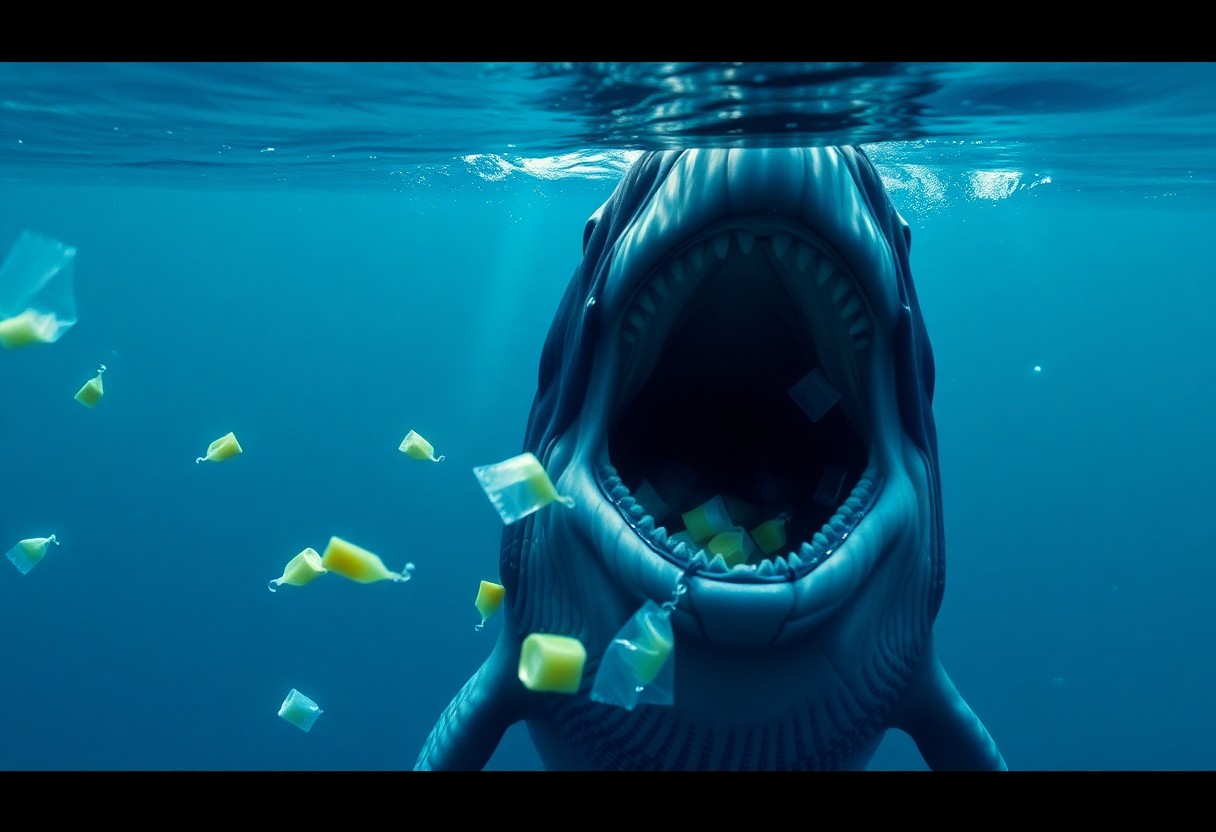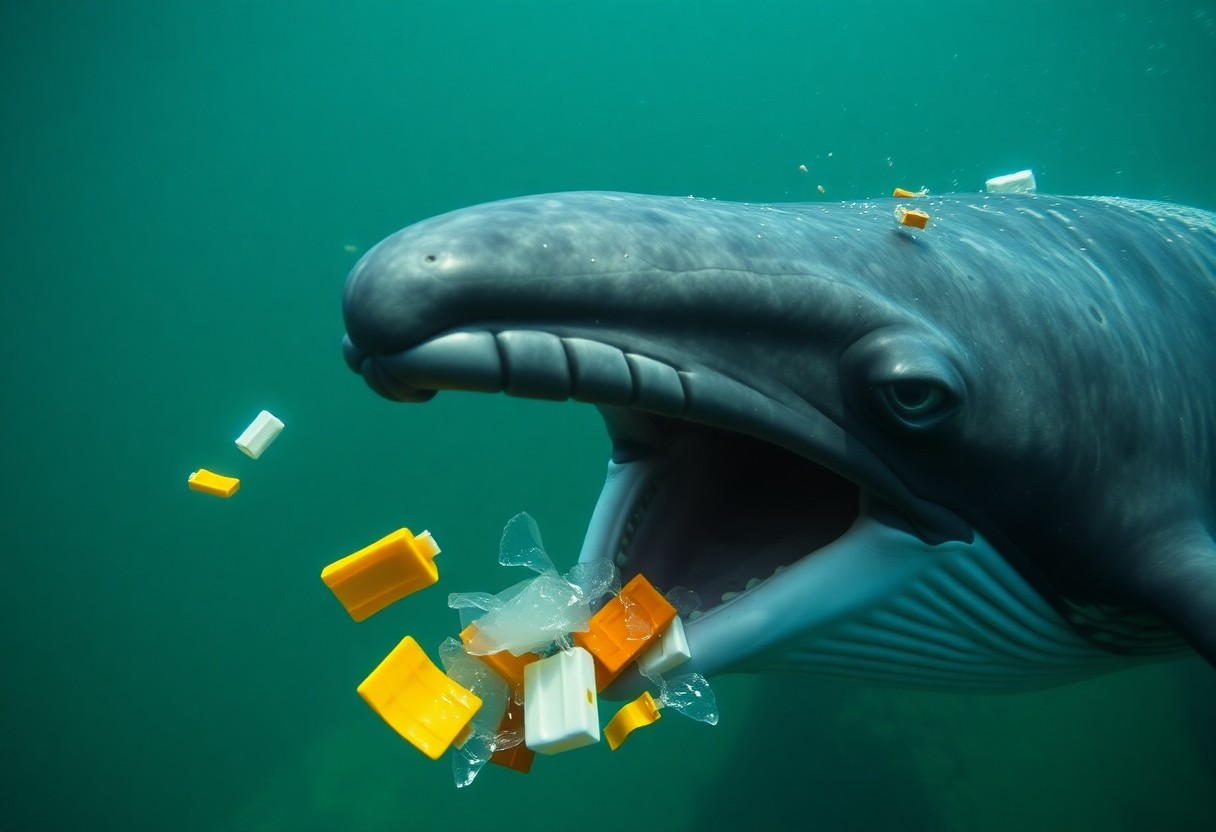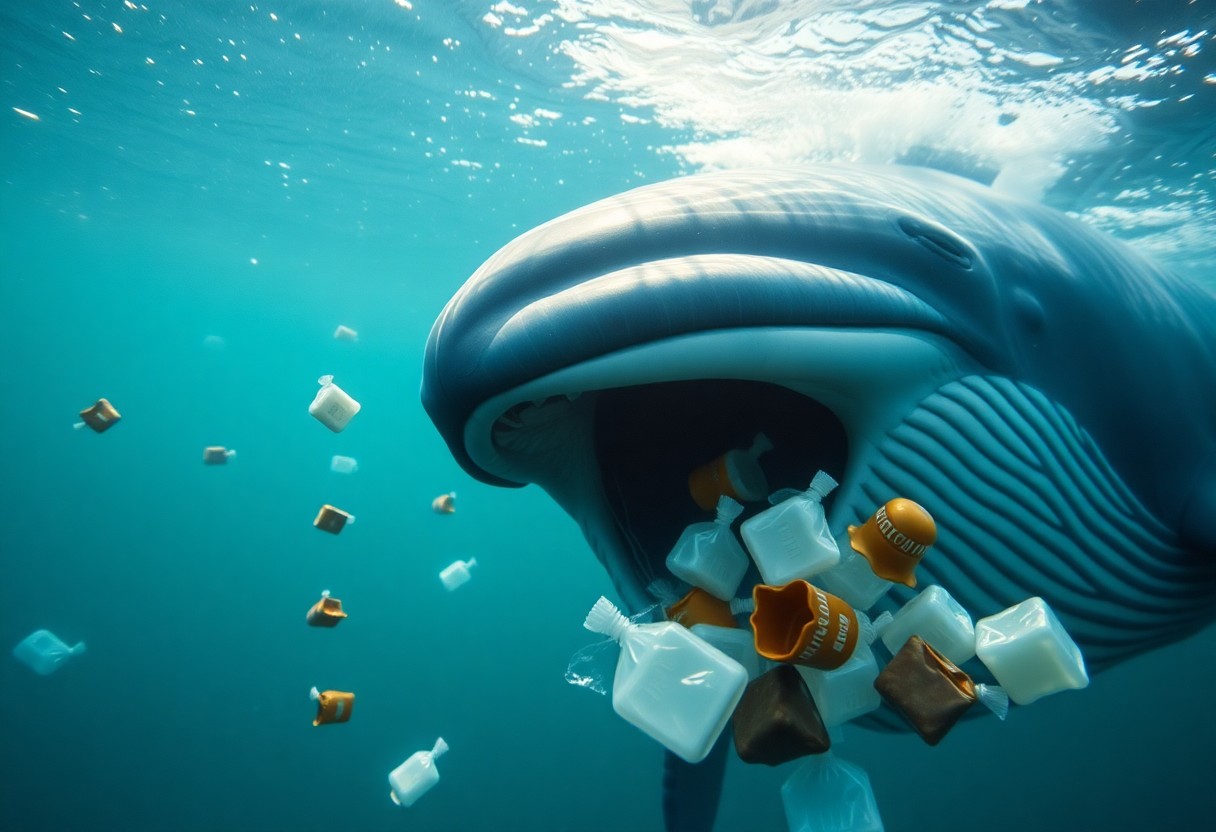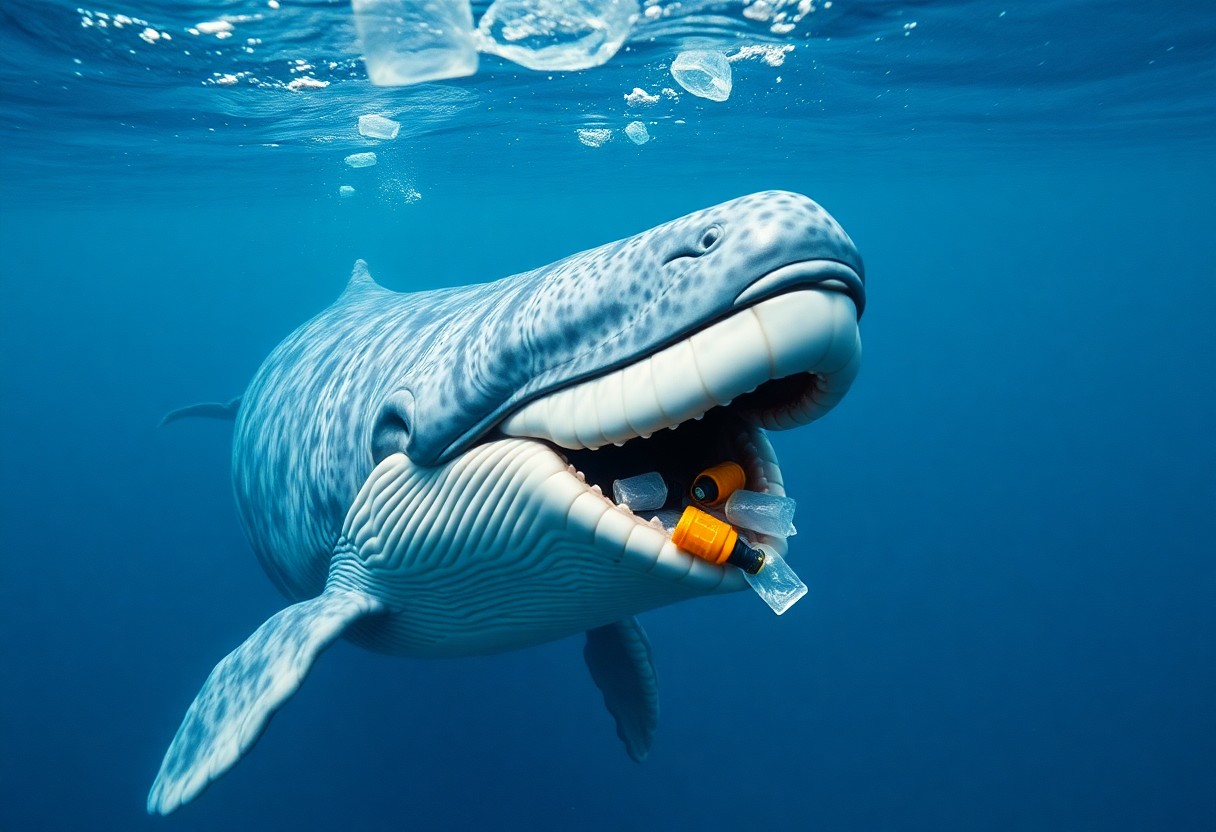With the increasing levels of marine pollution, you may be surprised to learn how whales are misidentifying plastic as food. This alarming trend highlights the impact of human activity on ocean life, as whales consume plastic debris thinking it is their natural prey. Understanding this phenomenon requires an exploration of the sensory mechanisms these majestic creatures use for feeding and the environmental challenges they face. In this post, you’ll discover the intricate relationship between marine pollution and the dietary habits of whales, shedding light on an issue that affects both wildlife and human health.

The Impact of Marine Pollution on Marine Life
To understand the dire consequences of marine pollution, you must recognize how it disrupts the entire ecosystem. Contaminants, such as plastics and chemicals, severely affect marine organisms, poisoning their habitats and leading to declines in population. These pollutants not only impact individual species but also threaten the balance of marine biodiversity imperative for a healthy ocean. You may be surprised to learn that marine animals often ingest these harmful substances, mistaking them for food, which leads to malnutrition and health issues.
Sources of Marine Pollution
Marine pollution primarily stems from various human activities, significantly impacting ocean ecosystems. You should be aware that the most common sources include:
- Industrial waste disposal
- Agricultural runoff
- Plastic waste
- Oil spills
- Urban wastewater
This leads to the accumulation of harmful substances, affecting marine life and their habitats.
Types of Plastics Found in Oceans
About 80% of the ocean’s plastic comes from land-based sources, resulting in a wide variety of plastics littering your oceans. Common types include:
- Microplastics
- Single-use plastics
- Fishing gear
- Plastic bags
- Plastic bottles
This troubling situation threatens marine ecosystems and poses risk to wildlife.
| Type of Plastic | Impact on Marine Life |
|---|---|
| Microplastics | Ingested by small fish, leading to toxic accumulation |
| Single-use plastics | Commonly mistaken for food by marine animals |
| Fishing gear | Causes entanglement and injury to marine species |
| Plastic bags | Harmful ingestion by sea turtles and other wildlife |
| Plastic bottles | Contribute to marine pollution and habitat destruction |
To grasp the severity of this issue further, consider the effects of each type of plastic on marine ecosystems. You might want to take note of how:
- Microplastics can disrupt hormonal systems in fish
- Single-use plastics are often found in stomachs of marine animals
- Discarded fishing gear acts as a deadly trap for many species
- Plastic bags can suffocate or block the digestive tracts of sea creatures
- Plastic bottles break down into smaller pieces, remaining in the ecosystem
This ongoing pollution presents significant challenges to marine environments that you should be aware of.
| Plastic Type | Potential Harm |
|---|---|
| Microplastics | Toxic effects on marine food webs |
| Single-use plastics | Reducing biodiversities, such as fish populations |
| Fishing gear | Long-term environmental damage and species decline |
| Plastic bags | Harming marine mammals and birds |
| Plastic bottles | Leaching harmful chemicals into the waters |
How Whales Misidentify Plastic as Food
One of the most alarming issues in marine pollution is how whales can mistakenly identify plastic debris as food. Their natural foraging behaviors, evolved over millions of years, are being disrupted by the increasing prevalence of plastic in the oceans. As these magnificent creatures consume a vast range of prey, the appearance of colorful plastics can easily trick them into thinking they are ingesting their usual diet, leading to detrimental health impacts.
Feeding Mechanisms of Whales
Beside the fascinating complexity of their feeding systems, whales utilize specialized techniques for capturing prey. Some species rely on filter feeding, while others may actively hunt individual fish or squid. These methods are efficient for their natural diet, but the introduction of plastic poses challenges, as many items can resemble their food sources in size and shape.
The Role of Visual and Sensory Cues
Visual cues play a significant role in a whale’s foraging strategy, coupled with their acute sensory systems that allow them to detect prey in their environment. However, with the increase of synthetic materials in the ocean, these cues can become misleading. Brightly colored plastics might mimic the appearance of natural prey, diverting whales’ attention from their actual food sources.
Role of visual and sensory cues is vital in guiding whales toward their diets. While these mammals possess remarkable eyesight and can detect changes in their environment, their ability to distinguish between organic and synthetic materials can be compromised. As you consider the ecological impact of marine pollution, it’s important to understand how plastic can disrupt the sensory systems of whales, tricking them into consuming harmful debris rather than their natural food.

Consequences of Plastic Ingestion by Whales
It is alarming to consider the severe ramifications that plastic ingestion has on whale populations. When whales mistakenly consume plastic, it can lead to internal injuries, blockages, and nutritional deficiencies, severely threatening their survival. The presence of plastic in their digestive systems interferes with their feeding processes, ultimately impacting their growth, reproduction, and overall health, which can ripple throughout their entire ecosystems.
Health Impacts on Whale Populations
Along with physical injuries, ingested plastic can leach harmful chemicals into the whales’ bodies, compromising their immune systems. This contamination can make whales more susceptible to diseases and negatively affect their reproductive health. Moreover, the stress of dealing with these adverse health effects can lead to decreased survival rates, which jeopardizes the stability of whale populations.
Ecological Consequences
One of the most significant consequences of whale plastic ingestion is the disruption of marine ecosystems. As apex predators, whales play a vital role in maintaining the balance of ocean habitats. When whale populations decline due to health issues from plastic ingestion, it creates a ripple effect that impacts other marine species and the food chain.
Plastic pollution not only harms whales but also disrupts the entire marine ecosystem. As whale populations diminish, their role as ecosystem engineers is compromised, affecting the abundance and diversity of marine life. This imbalance can lead to overpopulation of certain species and the decline of others, which alters community structures and compromises the health of ocean habitats. Ultimately, this degradation threatens the fishing industry, tourism, and overall ocean health, demonstrating that the consequences of plastic ingestion extend far beyond the individual whale. By addressing this issue, you contribute to preserving marine biodiversity and ensuring a healthier ocean for future generations.
Current Research and Findings
Unlike past assumptions, recent studies reveal that whales are increasingly mistaking plastic waste for food due to its colorful appearance and similar textures to natural prey. This misidentification is leading to severe health issues and rising mortality rates among these majestic creatures. Research from various marine biology institutions highlights the alarming correlation between marine pollution and whale health, emphasizing the importance of understanding this environmental crisis.
Studies on Plastic Ingestion
Research indicates that extensive plastic ingestion among whales has been linked to a range of health problems, including gastrointestinal blockages, malnutrition, and even death. Through analyzing stomach contents, scientists have found alarming quantities of plastic debris in several whale species, highlighting the need for urgent action.
Mitigation Efforts
On a global scale, various organizations are implementing innovative strategies to reduce plastic pollution in marine environments. These initiatives aim to raise awareness, improve waste management, and promote sustainable practices to protect marine wildlife.
In fact, numerous countries have initiated bans on single-use plastics and are investing in public education campaigns focused on marine conservation. Community-led clean-up programs and collaborations with technology companies are also emerging, utilizing innovative solutions to track and eliminate plastic waste in oceans. By participating in these efforts, you can contribute to saving whales and preserving marine ecosystems for the future.
Public Awareness and Education
Many people remain unaware that marine pollution significantly impacts whales. For example, Whales that use echolocation mistake plastic for prey: study highlights the severity of this issue. Enhancing public awareness through education can help spread vital information about how plastic in the ocean affects marine life. Combining efforts from communities, schools, and organizations can empower you to make informed choices that reduce plastic use and protect our oceans.
Importance of Marine Conservation
Across the globe, marine conservation plays a significant role in safeguarding ocean ecosystems. Healthy oceans are vital not only for marine life, like whales, but also for the overall health of our planet. By protecting these vital ecosystems, you contribute to maintaining biodiversity and promoting a sustainable future for both marine species and human populations.
How Individuals Can Help
Importance of individual actions cannot be overstated in the fight against marine pollution. By making conscious choices, you can reduce plastic waste and support cleaner oceans, which in turn benefits marine life. Simple steps such as using reusable bags, participating in local clean-up efforts, or advocating for waste reduction policies can create a positive impact.
Also, when you spread awareness about the importance of reducing plastic consumption, you inspire others to consider their daily habits. Support local conservation organizations and get involved in beach clean-ups or educational initiatives that highlight the interconnectedness of human actions and ocean health. By taking small steps in your own life, you can champion a cleaner, healthier ocean for whales and other marine life.

Future Directions in Research and Policy
Not only do we need to enhance our understanding of how whales misidentify plastic as food, but future research should also explore the impact of marine pollution on entire ecosystems. You can read about the plight of marine animals in detail in this Why marine animals can’t stop eating plastic article. As policy adapts, it’s imperative for researchers and policymakers to collaborate to develop strategies that reduce plastic ingestion among marine life.
Innovative Solutions to Reduce Pollution
Directions for innovative solutions may include developing biodegradable materials that can replace single-use plastics and implementing advanced waste management systems. Encouraging local communities to engage in beach clean-ups and promoting awareness about pollution’s impact on marine species can create a collective change. Additionally, fostering the research of alternative materials can significantly aid in reducing ocean plastic.
Collaboration Between Governments and Organizations
Around the world, it is vital for governments and organizations to unite in the fight against marine pollution. This collaboration can lead to the development of comprehensive policies aimed at reducing plastic usage and enhancing recycling efforts. By working together, you can support initiatives that promote sustainable practices and hold corporations accountable for their plastic footprints.
In fact, many countries are already forming alliances with environmental organizations to share best practices in tackling marine pollution. This collaboration can result in joint funding opportunities for research projects as well as educational campaigns that highlight the importance of ocean health. When you become involved in such initiatives, you contribute to a more sustainable future for marine life and ecosystems, ensuring that you play a part in addressing the plastic crisis effectively.
1. Marine pollution confuses whales during feeding.
2. Plastic resembles natural prey in the water.
3. Ingested plastic harms whale health and digestion.
4. Bright colors attract whales to plastic debris.
5. Plastic accumulation disrupts marine ecosystems significantly.
6. Awareness and cleanup efforts are urgently needed.
To wrap up
Hence, understanding how whales misidentify plastic as food due to marine pollution is vital for you as a responsible global citizen. You’re encouraged to recognize the impact of your actions on ocean health, as marine debris can lead to dire consequences for these magnificent animals. By becoming an advocate for reducing plastic use and supporting cleanup initiatives, you play a pivotal role in protecting marine ecosystems and ensuring the survival of whales and other marine life.



